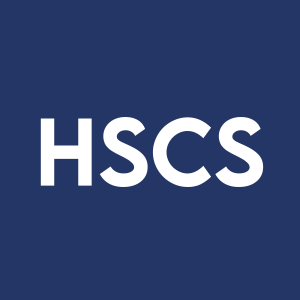HeartSciences’ Announces Peer-Reviewed Publication Evaluating Use of MyoVista® Technology to Detect Asymptomatic Left Ventricular Dysfunction in Patients with Type 2 Diabetes
Data Demonstrated MyoVista AI-ECG model significantly outperformed NT-proBNP and ARIC HF score, the conventional standards of care for Stage B Heart Failure screening
Southlake, Texas, March 12, 2024 (GLOBE NEWSWIRE) -- Heart Test Laboratories, Inc. d/b/a HeartSciences (NASDAQ: HSCS; HSCSW) (“HeartSciences” or the “Company”), an artificial intelligence (AI)-powered medical technology company focused on transforming ECGs/EKGs to save lives through earlier detection of heart disease, today announced the publication, in Cardiovascular Diabetology, of an independent, peer-reviewed study utilizing its MyoVista® proprietary technology.
Recent guidelines propose N-terminal pro-B-type natriuretic peptide (blood test for NT-proBNP protein marker) for recognition of asymptomatic left ventricular (LV) dysfunction (Stage B Heart Failure, SBHF) in type 2 diabetes (T2DM) patients. Accordingly, the study sought to evaluate whether an AI-ECG model based on MyoVista® wavECG™ features was superior to NT-proBNP, as well as a conventional screening tool—the Atherosclerosis Risk in Communities (ARIC) HF risk score, in SBHF screening among patients with T2DM.
The authors of the publication stated, “Among patients with T2DM, the accuracy of ewECG (MyoVista® wavECG™) model in SBHF screening was shown to be significantly higher than both NT-proBNP and the ARIC HF risk score,” and concluded, “Machine learning based modelling using additional ewECG extracted features are superior to NT-proBNP and ARIC HF in SBHF screening among patients with T2DM, providing an alternative HF screening strategy for asymptomatic patients and potentially act as a guidance tool to determine those who required echocardiogram to confirm diagnosis.” 1
“Around 38 million people in the United States and approximately 500 million people globally have diabetes, a major cause of cardiovascular health issues. This independent study provides evidence of the clinical and diagnostic capabilities of AI-ECG, and specifically our MyoVista wavECG technology, to potentially advance current standards of care for heart screening in diabetic patients.” said Andrew Simpson, Chief Executive Officer of HeartSciences. “Globally cardiovascular disease accounts for approximately one-third of all annual deaths and AI-ECG is set to change medicine by providing the opportunity to detect heart disease earlier and more effectively, not only for diabetic patients, but also for a significant number of at-risk patients. We look forward to continued progress developing our extensive portfolio of AI-based ECG/EKG algorithms and bring new AI-powered ECG capabilities to the healthcare community.”
1 - Use of the energy waveform electrocardiogram to detect subclinical left ventricular dysfunction in patients with type 2 diabetes mellitus Cheng Hwee Soh1,2, Alex G. C. de Sá2,3,4,5, Elizabeth Potter1, Amera Halabi1, David B. Ascher2,3,4,5 and Thomas H. Marwick1,2,6*
About HeartSciences
Heart Test Laboratories, Inc. d/b/a HeartSciences is a medical technology company focused on applying innovative AI-based technology to an ECG (also known as an EKG) to expand and improve an ECG's clinical utility. Millions of ECGs are performed every week and the Company's objective is to improve healthcare by making it a far more valuable cardiac screening tool, particularly in frontline or point-of-care clinical settings. HeartSciences has one of the largest libraries of AI-ECG algorithms and intends to provide these AI-ECG algorithms on a device agnostic cloud-based solution as well as a low-cost ECG hardware platform. Working with clinical experts, HeartSciences ensures that all solutions are designed to work within existing clinical care pathways, making it easier for clinicians to use AI-ECG technology to improve their patient's care and lead to better outcomes. HeartSciences' first product candidate for FDA clearance, the MyoVista® wavECG™, or the MyoVista®, is a resting 12-lead ECG that is also designed to provide diagnostic information related to cardiac dysfunction which has traditionally only been available through the use of cardiac imaging. The MyoVista® also provides conventional ECG information in the same test.
For more information, please visit: https://www.heartsciences.com. X: @HeartSciences
Safe Harbor Statement
This announcement contains forward-looking statements within the meaning of Section 27A of the Securities Act of 1933, as amended, and Section 21E of the Securities Exchange Act of 1934, as amended. These forward-looking statements are made under the "safe harbor" provisions of the Private Securities Litigation Reform Act of 1995 and relate to the Company's future financial and operating performance. All statements, other than statements of historical facts, included herein are "forward-looking statements" including, among other things, statements about HeartSciences' beliefs and expectations. These statements are based on current expectations, assumptions and uncertainties involving judgments about, among other things, future economic, competitive and market conditions and future business decisions, all of which are difficult or impossible to predict accurately and many of which are beyond the Company's control. The expectations reflected in these forward-looking statements involve significant assumptions, risks and uncertainties, and these expectations may prove to be incorrect. Investors should not place undue reliance on these forward-looking statements, which speak only as of the date of this press release. Potential risks and uncertainties include, but are not limited to, risks discussed in HeartSciences' Annual Report on Form 10-K for the fiscal year ended April 30, 2023, filed with the U.S. Securities and Exchange Commission (the "SEC") on July 18, 2023, HeartSciences' Quarterly Report on Form 10-Q for the fiscal quarter ended October 31, 2023, filed with the SEC on December 14, 2023, and in HeartSciences' other filings with the SEC at www.sec.gov. Other than as required under the securities laws, the Company does not assume a duty to update these forward-looking statements.
Contacts:
HeartSciences
Gene Gephart
+1-682-244-2578 (US)
info@heartsciences.com
Investors
Gilmartin Group
Vivian Cervantes
investorrelations@heartsciences.com









